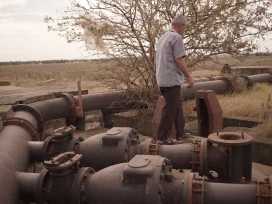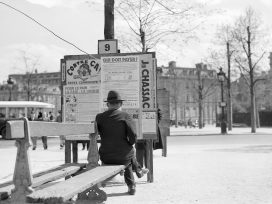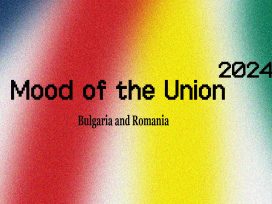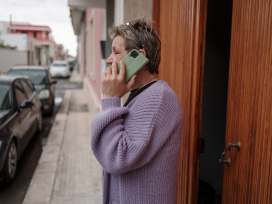 At the beginning of the 1990s, when Romania was striving to become a democratic society, “the West” was often referred to in public debate. Commentators, whether writing about politics, the functioning of public administration, or city cleaning, would wonder, “when we too will have a normal society”. It was generally understood that a “normal” society was supposed to be a western-style one. “The West” was also a frequent term of reference in daily life. In the classified sections of the newspapers, you could read advertisements such as: “Apartment for sale with western type upgrades.” This meant that the grim blocks of flats built under Ceausescu were starting to be “brightened up” with all sorts of decorations and accessories imported from western European countries. Along with the ability to afford the significant hike of prices, this presupposed buyers’ aspiration for a certain degree of comfort, for the feeling of “normality” of life in apartments that were shoddily conceived and built during a regime that compelled people to survive rather than lead genuine lives.
At the beginning of the 1990s, when Romania was striving to become a democratic society, “the West” was often referred to in public debate. Commentators, whether writing about politics, the functioning of public administration, or city cleaning, would wonder, “when we too will have a normal society”. It was generally understood that a “normal” society was supposed to be a western-style one. “The West” was also a frequent term of reference in daily life. In the classified sections of the newspapers, you could read advertisements such as: “Apartment for sale with western type upgrades.” This meant that the grim blocks of flats built under Ceausescu were starting to be “brightened up” with all sorts of decorations and accessories imported from western European countries. Along with the ability to afford the significant hike of prices, this presupposed buyers’ aspiration for a certain degree of comfort, for the feeling of “normality” of life in apartments that were shoddily conceived and built during a regime that compelled people to survive rather than lead genuine lives.
Such references to an undifferentiated “West” ruled out cultural specifics: for us Romanians, the cultural, urban, and social differences between Palermo and Stockholm, between Vienna and Marseille, had little, if any, relevance; it didn’t matter that there were significant variations in the democratic systems of Britain and Switzerland. These were “subtleties” that more often than not went unheeded by the buyers and sellers of apartments. “Normality” meant the recovery of a certain way of life specific to western societies: democratic institutions and public administration placed in the service of the citizen, along with the right to live as one liked, to read the books one wanted, to travel freely and to say what one thought, without fearing an all-powerful “Big Brother”. We were probably naive and ignorant: in an age when the West was awash with discussions about cultural difference, it was the common values of the West that were more important to us. One thing is certain, however: that this rediscovery of the West, after decades of isolation imposed by the Communist regime, has generated – in Romania and in all the countries in eastern Europe – the invigorating feeling of aspiration towards a world that, from a geographical and cultural point of view, we knew we belonged to, but whose concrete representations had reached us mostly as exceptions – or deviations – from the norm.
In the meantime, of course, things have become more refined. Cultural difference has, at long last, reached the classified ads, which are now phrased something like: “Apartment for sale: Italian sandstone, Spanish tiles, German double glazing, Austrian sanitary fittings.” The fact that a former Romanian prime minister has been accused of accepting thermopane windows “made in China” as bribe is yet further proof of globalization…
“The Western way of life”, through which we hoped to recover our normality, has eventually taken shape, though for the time being in its primitive forms: we have adopted the pleasures of consumerism, are stimulated by the new hypermarkets, are buying imported cars (after decades of living with the Dacia, the autochthon car that had accompanied our survival during Communism); we frantically go on holiday in Spain or in Greece and are big consumers of TV programmes (especially blockbusters, reality-shows, and entertainment produced in the West). At least, that is the dominant behaviour in Bucharest and in the big cities. In the countryside (it should be noted that 40% of Romania’s population lives in rural areas) “the West” has not penetrated as far, the comforts of modern life are still an aspiration, subsistence agriculture is still practiced, people still travel in horse-drawn carts. As such, “the search for normality” has shifted from the East-West spatial axis to a temporal one: we go to the countryside to rediscover the charms of life as it used to be, to enjoy natural food (not available in supermarkets), the peace of nature, and straightforward and friendly relationships with people. In doing so, we are probably in sync with the average westerner, who migrates from the city every weekend to places where he or she can “retreat” from today’s comfortable, but stressful, technological civilization.
However the search for normality also implies something different from such changes in daily behaviour and social practices. In Romania, after the fall of communism, discourse about identity has burgeoned in the public sphere: for nearly two decades now, we have been debating who we are and how we are. We secretly wish to reach the conclusion that we’re a nation like any other, with successes and failures, with qualities and flaws, and that all these are natural. Yet for the time being, we don’t know how to talk about all these things in a normal way, and seek compensatory refuge in asserting “the exception”, our differences with respect to “those westerners”, who do not understand us simply because they had a different history for the past half-century. Some of us evoke the interwar period, when Bucharest was considered the “Little Paris”, and think that the communist regime was a big historical break, a period that has turned us into moral, intellectual, and social wrecks. Others insist on our Orthodox faith and on our rural traditions, which, they say, we are about to lose due to a hasty assumption of the Western model. Yet others believe, fatalistically, that we will remain a small, provincial culture situated on the fringes of Europe, where the “Western model” will never be successful, mainly because we are resistant to norms and rules. Still others count the cultural values that we have given Europe and the world – usually, a short list of names: Mircea Eliade, Emil Cioran, Eugene Ionesco, Constantin Brancusi and George Enescu – and from this draw the conclusion that we are a major culture, able to enter into a dialogue of peers with other European cultures.
These are the disputes on which we have been wasting our energy for a long time, failing to notice that, in the meantime, we are facing the same problems as all the “others” and that, in fact, Europe has already accepted us, as we are, identity crises and all. As of 1 January 2007, our country has been a member of the European Union, even if – European citizens at last – we do not always behave as such. After looking, for years on end, for “Western-type normality”, we are gradually discovering that it is not normality but normalities that this is all about – intricate, dynamic states and situations, into which we must integrate ourselves. The positive mythology of the free and prosperous West, which we created during the dictatorship, has now been replaced by the empirical observation of a complex reality, encompassing similar problems to ours, but on a different scale and with other nuances. For years on end, we believed that we would enter a space of normality, and what we discover now is a Europe rather different from that of our mental projections.
The debate about identity is lively and topical across the continent: from social group identities to new “ethnicities”, from the crisis of the youth on the outskirts of big cities to immigrant communities, everything is being redefined. The “European citizenship” that the political leaders have long been speaking about, a noble theoretical construct, has since been invalidated by the reality of opinion polls and referendums. After decades of European institutional construction, we are speaking about “the crisis of European institutions”. We wanted to live like in France, yet we now see that France needs thorough reforms. We were ashamed of the nationalistic and intolerant discourse of some Romanian political parties during the 1990s, yet now we are rediscovering it, in various shapes, in countries we thought of as tolerant and open. We thought it normal that easterners should emigrate to the West, looking for a better life, and now we are preparing to receive immigrants that are “more eastern than ourselves”. When the owner of a garment factory in eastern Romania brought over 200 female workers from China, we suddenly discovered “how western we are”. Above and beyond these, issues like global warming and international terrorism are paradoxically strengthening our consciousness of belonging to an open world, with common values, but also with major differences.
We might not have been prepared for all this. We used to believe that, at the end of the transition from communism, normality would be just waiting for us; now, in the real world, we are forced to step into a different type of transition. We have been debating at length our cultural and national identity, and now we find ourselves in a western world that is itself questioning its identity and its values. We had been looking for paradise, only to be told that we have just entered a minor apocalypse. But there is nothing dramatic in this. In fact, we easterners are experts of transitions and survival. For many of my fellow citizens, such fields of expertise implicitly made us inexperienced when it came to normality: normality is not about surviving, about crossing dangerous places and times. We know how to deal with these: what then of our dreams of normality?
Andrei Plesu said at the opening conference of the Salzburg Festival in 2003 that our experience might prove useful to Europe as a whole: “On the eve of a ‘major’ apocalypse, the West, with its wonderful technology, its extraordinary specialists, its financial means, will be the one able to save mankind. But if what is threatening us is a ‘minor’ apocalypse, then count on central and eastern Europe! We will quickly teach you the skills of living with less, of turning Ersatz into real substance, of relishing trifles…”. I would add that, after whole decades of idealizing “western normality”, we are rediscovering the usefulness of the normality that we were accustomed to: the normality of crisis, the capacity to adjust to change, the preservation of our sense of humour, even under dramatic circumstances, the sense of improvisation, of “taking things as they come”.
Since the fall of communism, we have also gained the advantage of being an open society; we have entered a fertile cultural dialogue, all of which was impossible before. Despite all lamentations, the publishing industry is thriving in Romania, cultural magazines are lively and interesting, the theatres are brimming, and our cities are visited by artists we dared not dream of before. The city of Sibiu is a European capital of culture, and we are gathered here in order to discuss normality. Nowadays, that is normal.
But it is just as normal to have dilemmas about normality. After all, there is no unique normality, only plural normalities, which should communicate among themselves, which should complete each other, and which should be built together. We, the easterners – and perhaps the Romanians especially – have “missed” the idea of western normality, which we have been dreaming about for such a long time. But we should be happy that things have turned out this way: we have missed an illusion and, in exchange, have become part of a European reality that continues to remain fascinating, despite all the anomalies. We only have to get to know it better and to debate it together, with its common values and its cultural differences. We will probably grasp its full meaning when the newspapers in London, Paris, or Berlin print in their classified sections advertisements such as: “House for sale on the Marne outskirts of Paris, built by Romanian masons, Polish plumbers, and Bulgarian electricians.”
 This article is based on the opening address at the 20th European Meeting of Cultural Journals in Sibiu from 21-24 September 2007.
This article is based on the opening address at the 20th European Meeting of Cultural Journals in Sibiu from 21-24 September 2007.

 At the beginning of the 1990s, when Romania was striving to become a democratic society, “the West” was often referred to in public debate. Commentators, whether writing about politics, the functioning of public administration, or city cleaning, would wonder, “when we too will have a normal society”. It was generally understood that a “normal” society was supposed to be a western-style one. “The West” was also a frequent term of reference in daily life. In the classified sections of the newspapers, you could read advertisements such as: “Apartment for sale with western type upgrades.” This meant that the grim blocks of flats built under Ceausescu were starting to be “brightened up” with all sorts of decorations and accessories imported from western European countries. Along with the ability to afford the significant hike of prices, this presupposed buyers’ aspiration for a certain degree of comfort, for the feeling of “normality” of life in apartments that were shoddily conceived and built during a regime that compelled people to survive rather than lead genuine lives.
At the beginning of the 1990s, when Romania was striving to become a democratic society, “the West” was often referred to in public debate. Commentators, whether writing about politics, the functioning of public administration, or city cleaning, would wonder, “when we too will have a normal society”. It was generally understood that a “normal” society was supposed to be a western-style one. “The West” was also a frequent term of reference in daily life. In the classified sections of the newspapers, you could read advertisements such as: “Apartment for sale with western type upgrades.” This meant that the grim blocks of flats built under Ceausescu were starting to be “brightened up” with all sorts of decorations and accessories imported from western European countries. Along with the ability to afford the significant hike of prices, this presupposed buyers’ aspiration for a certain degree of comfort, for the feeling of “normality” of life in apartments that were shoddily conceived and built during a regime that compelled people to survive rather than lead genuine lives.






